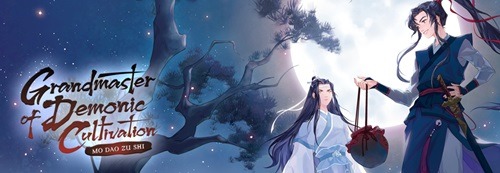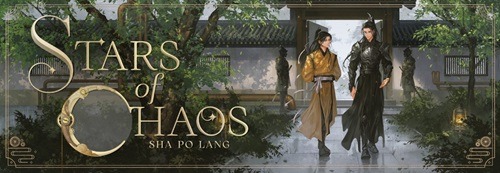Weishenmewwx - 我姓蓝,爱巍澜,最喜欢蓝色

More Posts from Weishenmewwx and Others

Now you know — view on Instagram https://ift.tt/3AGm34f
How would you lure someone into reading MXTX's novels beyond the usual "the main CP is this and that"? Cos for example, every time someone tells me to read MDZS, they mostly just say Wangxian is married and have a child and leave it at that, which isn't encouraging at all??? Sorry to bother you with this question. I love reading your responses though!
Hi there anon!~
I think pitching MXTX novels as purely “couple is so-and-so” is also a bit of a disservice, too! One of my favorite things about many danmei novels is indeed that they are very plot-heavy and contain lots of thought-provoking concepts. For the sake of this answer, I will limit it to MDZS since you gave that as an example.
For me, the most interesting thing about MDZS is not necessarily that “Wangxian are married and have a son” but the actual struggles that both Wei Wuxian and Lan Wangji endure in order to get to a point where they can be happy together. It takes one of them dying and coming back, plus the shattering of social complacency that occurs during the present timeline of the novel. And even then, that’s not even really the main focus of the novel, it’s more like a product of everything else that happens. Their history is also long and marred with anger, confusion, heartbreak, and understanding.
I have my own preferences of how I read Wei Wuxian, for example, that I think differs from other people’s. Same for how I like to interpret Wangxian. In an effort not to rock the boat, I’ll just say that I think Wangxian is a very compelling and interesting couple because they both put in work to make it work. I like thinking of how they are just very fundamentally different people, but do well together because they choose to.
But again, I think MXTX made a point also in not focusing too much on their relationship itself, but rather the plot and how/why it develops the way it does. She had something she wanted to say with this work, as she does with each one of her works. MDZS is first and foremost a murder-mystery with the background of a war story. It’s about the dangers of mob mentality, how fast the crowd will turn against you if you step out of line. It’s about how rocking the boat has far-reaching consequences, and how society often wants the easiest and cheapest way to morality. It’s about how the pressure to be perfect will shatter someone, yet the cracks may not show until it’s too late. How oppression can make both heroes, and monsters – and that sometimes, that distinction is simply a matter of who is telling the story.
(I also want to note that there’s also the one theme that MXTX seems to really favor, and is present in all 3 of her works: having one person on your side can be enough.)
These are all incredible concepts that I think are really worth reading the novel for. Not to mention, they are eternally relevant conversations to have. MDZS is a novel painted in gray, and deserves thoughtful consideration of such. (Of course, it can also just be a lot of fun!) Even how you view the main character is absolutely dependent on what perspective you want to see him through. This itself is really interesting and unique.
The way the novel ends, with a lot let unsaid – intentionally so – is bittersweet yet satisfying. Fascinating in the sense that yeah, not everyone gets a happy ending, but in a way that genuinely makes sense. (But if you’re worried, fear not, Wangxian do end up married and with a son, after all lol!)
Ultimately, these are adult novels, meant for an adult audience – and created as much for the purposes of having fun, as they are to be discussed and analyzed through a scholarly lens. So I definitely share your frustration in being pitched a novel purely on the couple, because YEAH I do care a lot about the couple (see: how I devote at least 80% of my brain power to thinking about Hualian kissing), but I also do want a story that is satisfying in more than just one way. I.e., is stratifying in both terms of its main couple’s relationship AND a fleshed-out plot line with lots of themes to analyze, because I like having fun in both of those ways!
I think even when we pitch other MXTX novels (or danmei novels in general), it’s helpful to do it the same way. To focus on what makes the novel great in its entirety, not just a small, reductive portion of it. Especially when it’s very clear that the author has so many things they’re trying to say with the work. However, I’ll end this here because this answer is getting so long lol! I hope this helped you out, anon, and maybe even sold you a little more on MDZS haha! (ノ´ヮ`)ノ*: ・゚
MDZS Vol 5 Annotations 6
Part 6 of 6, page 383 - end
♥️

Chinese is so fun. 让他追在我后面跑 I think translates better to “make him run away, but I’ll be in front so he’ll be chasing behind me.”
More under the cut.






And that’s it! The whole story.
Thank you for reading with me.
MDZS Masterlist.
All the Books I'm Annotating Masterlist.
二哈和他的白猫师尊 The Husky and His White Cat ShiZun
Book Annotations
I feel like this translation is great. It's smooth and easy to read, and I feel like it conveys the story really well.
As I prepare to hand this book over to my non-Chinese friends, I do have a few notes, though.
How to pronounce people's names.
Usage of the word "Master" vs "Teacher"
Book 1
Pages 1-182
Pages 185-end
Book 2
Pages 1-132
Pages 137-198
Pages 208-327
Pages 366-end
Book 3
Pages 1-end
Book 4
Pages 1-end
listen, i’m a sucker for all of wei ying’s different smiles😤

this awkward and confused why is he being nice to me because he loves you dumbass smile

this haha that was kinda embarrassing haha sorry sheepish grin

this watery god i love you so much you fuddy-duddy

the i am literal sunshine and i know it

the pained but silent resignation

just. evil. and maybe illegal

the i’m babie smile reserved for shijie and shijie only

the drunk cutie

this maybe i am up to no good hehe smile

smiling through the rain. i mean pain
that’s it for now but ik there’s definitely more so feel free to add to it!!




some baby kermit gifs to brighten your day 💚
My Danmei 耽美 Literary Adventure
Seven Seas Chinese Danmei novels, Notes Masterlist
Some of my favorite books, especially, The Grandmaster of Demonic Cultivation, The Husky and His White Cat Shizun, Stars of Chaos, and Guardian, are now officially in English! Thank you, Seven Seas.
These notes are here to help friends who may not speak Chinese or have enough Chinese cultural background to understand the nuances presented in these works, or are just getting confused with all the different terms of address.
Please forgive me if I have missed anything, and dm or comment if you have anything to add!

魔道祖师 Grandmaster of Demonic Cultivation
by MXTX

二哈和他的白猫师尊 The Husky and His White Cat ShiZun
by Meatbun 肉包不吃肉 (Rou Bao Bu Chi Rou)
Usage of the word "Master" vs "Teacher"
How to pronounce people's names (bc it does NOT follow the rules of English pronunciation)
Book Annotations

杀破狼 Stars of Chaos
by Priest
Vol 1-4 are here!
(Volume 5 notes will arrive next.)

镇魂 Guardian
by Priest
Coming eventually :)
hey there!! hoping to get your input on this: ive seen plenty of fics where characters across the cql board will say just very openly "i love you." i don't know if this is a common way of expressing romantic love in ancient china? i could be wrong, but the FEELING i get is that it's more common to use gestures, or allude metaphorically to some poem/story instead of being so direct? i think theres an old-fashioned jpn phrase like "i'll make soup for u every day" to confess, anything similar here?
oof, so I’m going to go ahead and start by saying that I don’t know nearly enough to be make generalized statements about how romantic love is expressed in ancient/dynastic China or even in modern-day, because I’m just not widely-read/steeped in the culture enough. And even if I were, I still don’t know if I could make definitive statements on what can be considered a “common way of expressing love” because there are as many ways to express love as there are people and permutations of relationships on this planet.
The renditions of love that tend to linger in our minds, however, tend to be defined by action: 梁山伯与祝英台 Liang Shanbo and Zhu Yingtai, the butterfly lovers inseparable by death; 牛郎织女 Niu Lang and Zhi Nv, a mortal man and celestial maiden, crossing to each other over a bridge over the Milky Way made of magpies; 孟姜女 Meng Qiangnv breaking open the Great Wall with the force of her tears. Just gonna... put that out there.
I did include a brief discussion of the character 爱 ai in this post, which is the character that’s pretty much translates to ‘love’ (and many of its complicated English valences) in modern Mandarin. Given an earlier reading of 爱 not as ‘love,’ but as ‘begrudging, cherishing’ makes the possibility of saying 我爱你 woaini rather...unlikely in ancient China (especially when you consider that 我 wo and 你 ni were different pronouns back then, too... what I’m trying to say is that a simple ctext search hasn’t been helping me here).
I am, however, willing to bet that writing/reciting poetry for your lover was a Thing, and it wouldn’t be me if I didn’t seize every possible opportunity to add gratuitous poetry to a post:
《上邪》/ Shangye
上邪!/ High Heaven!
我欲与君相知,/ I want for us both to know each other
长命无绝衰。/ as long as life, with no decline or end
山无陵,江水为竭,/ When mountains lose their peaks, when river waters dry up,
冬雷震震,夏雨雪 ,/ when thunder rumbles in winter; when rain and snow fall in summer
天地合,乃敢与君绝!/ when sky and earth seal back together, only then will I dare end things with you!
One of the shortest pieces in the Hanyuefu, which I mentioned briefly in this post, 《上邪》 is an incredibly powerful declaration of love, loyalty, and devotion without using any of the above words (it does, however, use 知 zhi / knowing).
Oh! Both 《上邪》and《卜算子》use 君 jun, which you might recognize from ‘Hanguang-jun’ or ‘Zewu-jun.’ In addition to being an honorific, 君 also appears often in poetry as a respectful second-person pronoun. Again, it’s technically gender-neutral, though most of the time it’s assumed to refer to a man.
《卜算子》李之仪, Busuanzi by Li Zhiyi (Northern Song Dynasty)
我住长江头,君住长江尾。/ I live at the head of the Yangtze; you live at the tail of the Yangtze,
日日思君不见君,共饮长江水。/ Day after day, I think of you but do not see you; we drink from the same river’s waters
此水几时休,此恨何时已。/ When will these waters rest? When will these feelings stop?
只愿君心似我心,定不负相思意。/ I only hope that your heart is similar to mine; I would not let down the intent of our mutual love.*
*note: this entire last line is rough, but I spent more time than I’d like banging my head against 相思, which I translated as ‘mutual love.’ It’s glossed in Pleco as ‘pining, lovesickness’ but literally means ‘mutual thought.’
The language of thought, of mutual thought, of the sentiment behind the phrase thinking of you, is something that goes way, way back. It’s in 《饮马长城窟行》, from the poetry post I linked earlier; it’s also referenced in the last line of 《楚辞·山鬼》Mountain Ghost from the Songs of the South: 思公子兮徒离忧 / only in thinking of you can I depart from sorrows.
Oh! Here’s a classic declaration of love -- literally, from the 《诗经》 Shijing / Classic of Poetry:
[...]
执子之手,与子偕老 / I’ll hold your hand, and with you grow old...
[...]
It’s the most famous line from 《国风·邶风·击鼓》which I think is actually a... war poem? So a poem that’s primarily all about that Mutual Loyalty and Manly Camaraderie, but one that has had its most iconic line co-opted for the sheer romance of it all.
I’m not going to translate《击鼓》 fully because trying to read the 《诗经》is one of my personal nightmares, but you can find it here on ctext with the James Legge translation, which, admittedly, takes some liberties with the text.
One last poem, because the last line is peak pining:
《越人歌》 Yuerenge
今夕何夕兮 搴洲中流,/ What evening is this evening? Drifting in the river current.*
今日何日兮 得与王子同舟。/ What day is today? That I can travel in the same boat as you, prince
蒙羞被好兮 不訾诟耻,/ I hide my shyness, cover my fondness; there will be no slander or gossip or shame*
心几烦而不绝兮 得知王子。/ My heart is troubled, unending -- to come to know you, prince
山有木兮木有枝,心说君兮君不知。/ On mountains, there are trees; on trees, there are branches -- my heart delights in you, and you do not know.
*leaning heavily on the baidu-baike glosses
The story I’ve always been told about 《越人歌》 is that a prince of Chu, fleeing political strife in his state, crosses a river in a boat poled by a young woman of the state of Yue. She recognizes the fleeing prince and sings this song to him as she poles across the river. The catch is that she sings it in the language of the state of Yue, so he has absolutely no idea that she’s confessing her admiration and love for him.
This story, according to my Google searches, is inaccurate, but OH WELL, the last line is still peak pining regardless.
-
 birchbird reblogged this · 1 month ago
birchbird reblogged this · 1 month ago -
 pixiee liked this · 1 month ago
pixiee liked this · 1 month ago -
 annoyingdelusioncloud liked this · 1 month ago
annoyingdelusioncloud liked this · 1 month ago -
 omeynzaol liked this · 1 month ago
omeynzaol liked this · 1 month ago -
 combefier reblogged this · 1 month ago
combefier reblogged this · 1 month ago -
 cineebon reblogged this · 1 month ago
cineebon reblogged this · 1 month ago -
 mythicalblance liked this · 1 month ago
mythicalblance liked this · 1 month ago -
 coloursoflovelustlife liked this · 1 month ago
coloursoflovelustlife liked this · 1 month ago -
 lunarian-queen reblogged this · 1 month ago
lunarian-queen reblogged this · 1 month ago -
 r1d3-th3-w1nd liked this · 1 month ago
r1d3-th3-w1nd liked this · 1 month ago -
 tattooed-lies reblogged this · 1 month ago
tattooed-lies reblogged this · 1 month ago -
 lock-my-feelings-in-a-jar liked this · 1 month ago
lock-my-feelings-in-a-jar liked this · 1 month ago -
 damage-incorp0rated reblogged this · 1 month ago
damage-incorp0rated reblogged this · 1 month ago -
 damage-incorp0rated liked this · 1 month ago
damage-incorp0rated liked this · 1 month ago -
 only-a-heartbeat-away reblogged this · 1 month ago
only-a-heartbeat-away reblogged this · 1 month ago -
 klouwnshu reblogged this · 1 month ago
klouwnshu reblogged this · 1 month ago -
 phosphateblues reblogged this · 1 month ago
phosphateblues reblogged this · 1 month ago -
 helloevad liked this · 2 months ago
helloevad liked this · 2 months ago -
 ky14-1 liked this · 2 months ago
ky14-1 liked this · 2 months ago -
 fragranceofintegrity liked this · 2 months ago
fragranceofintegrity liked this · 2 months ago -
 celestialprotectress reblogged this · 2 months ago
celestialprotectress reblogged this · 2 months ago -
 xno-grafica liked this · 2 months ago
xno-grafica liked this · 2 months ago -
 midnightmusic96 liked this · 2 months ago
midnightmusic96 liked this · 2 months ago -
 28thboulevard liked this · 2 months ago
28thboulevard liked this · 2 months ago -
 specre reblogged this · 2 months ago
specre reblogged this · 2 months ago -
 specre liked this · 2 months ago
specre liked this · 2 months ago -
 horses-5th-edition reblogged this · 2 months ago
horses-5th-edition reblogged this · 2 months ago -
 lephester reblogged this · 2 months ago
lephester reblogged this · 2 months ago -
 neelshereee liked this · 2 months ago
neelshereee liked this · 2 months ago -
 millennialem liked this · 3 months ago
millennialem liked this · 3 months ago -
 nox-wolves liked this · 3 months ago
nox-wolves liked this · 3 months ago -
 disappointmint liked this · 3 months ago
disappointmint liked this · 3 months ago -
 tengoku-e-no-tobira liked this · 3 months ago
tengoku-e-no-tobira liked this · 3 months ago -
 gecesevgilisi liked this · 3 months ago
gecesevgilisi liked this · 3 months ago -
 thebrofriends liked this · 3 months ago
thebrofriends liked this · 3 months ago -
 novalleysorbumpsridgesorlumps liked this · 3 months ago
novalleysorbumpsridgesorlumps liked this · 3 months ago -
 stressed-cherry liked this · 3 months ago
stressed-cherry liked this · 3 months ago -
 imaflower liked this · 3 months ago
imaflower liked this · 3 months ago -
 daisysyelena liked this · 3 months ago
daisysyelena liked this · 3 months ago -
 arnith87 liked this · 3 months ago
arnith87 liked this · 3 months ago -
 bookishpower liked this · 3 months ago
bookishpower liked this · 3 months ago -
 lesbianagentofnothing reblogged this · 3 months ago
lesbianagentofnothing reblogged this · 3 months ago -
 angelowl-fics reblogged this · 3 months ago
angelowl-fics reblogged this · 3 months ago -
 kellan-l liked this · 3 months ago
kellan-l liked this · 3 months ago -
 nossbean reblogged this · 3 months ago
nossbean reblogged this · 3 months ago -
 amid-centuryhousewife reblogged this · 3 months ago
amid-centuryhousewife reblogged this · 3 months ago -
 amid-centuryhousewife liked this · 3 months ago
amid-centuryhousewife liked this · 3 months ago -
 am918 reblogged this · 3 months ago
am918 reblogged this · 3 months ago -
 reids-gf liked this · 3 months ago
reids-gf liked this · 3 months ago




